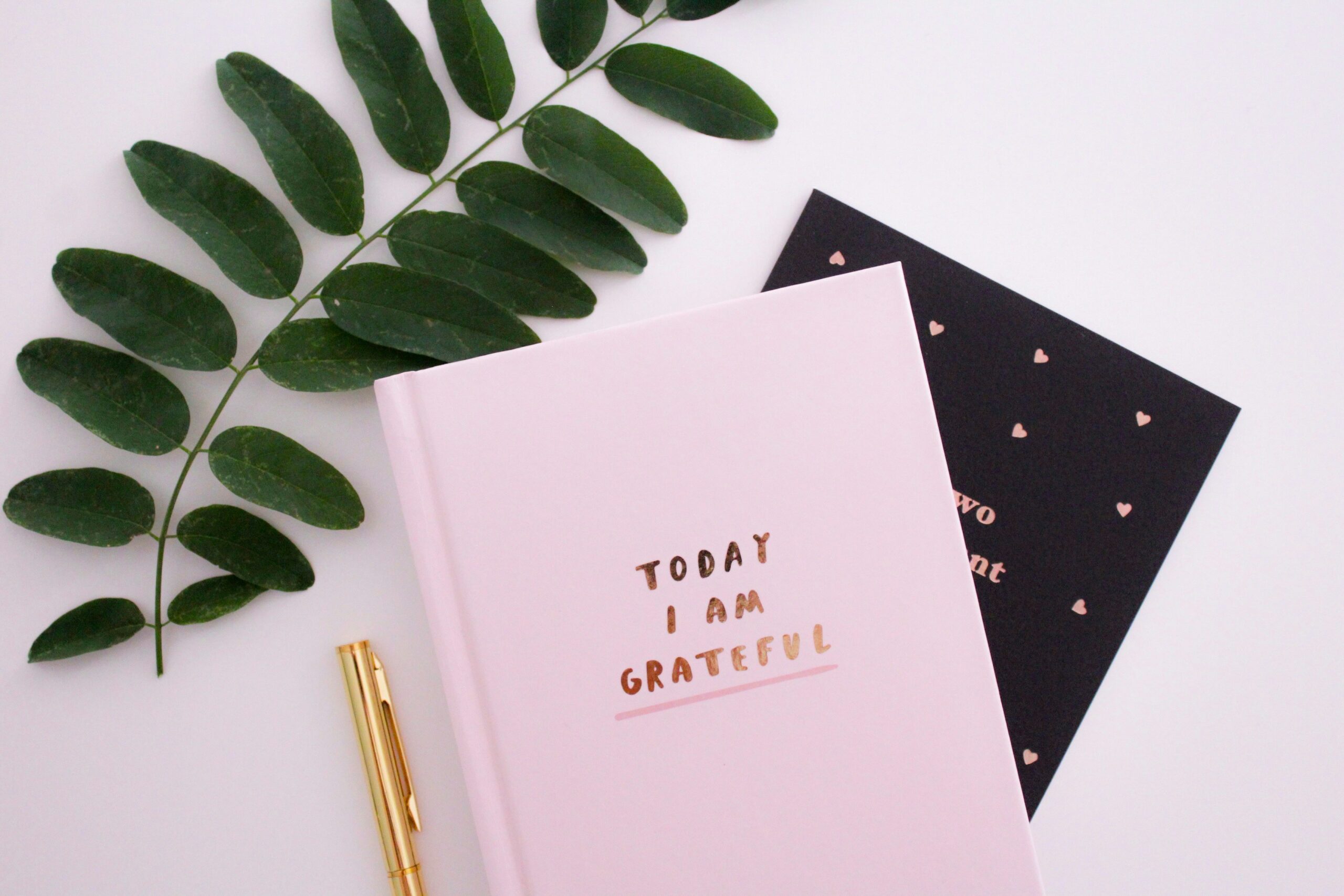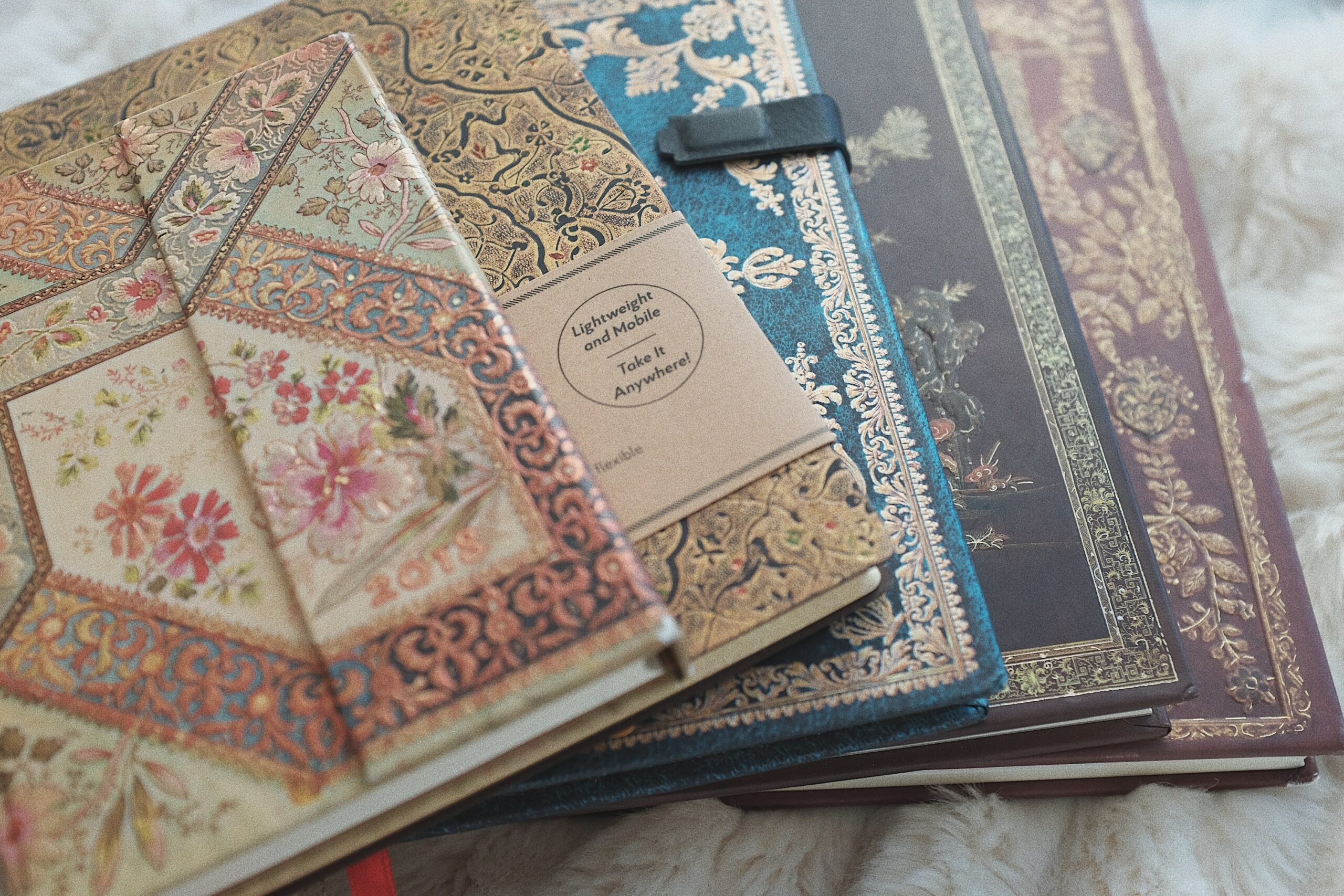Journaling is a powerful tool for personal development and a secret weapon for maintaining mental health. Think of it as your personal therapist, career coach, and wise sage, all rolled into one quaint notebook. Whether you’re unloading the day’s stresses, sketching out your dreams and goals, or simply jotting down what you’re grateful for, journaling can be your beacon of light in a sometimes chaotic world.
But wait, before you say, “That sounds great, but where do I even start?” – that’s exactly why we’re here! In this article I will share with you 5 Journaling Ideas for Beginners. From the simplicity of one-line-a-day entries to the reflective depth of themed journals, there will be at least one idea you’ll want to try.
All you need is a pen, a notebook, and an open heart. I’ve been journaling for over a decade now and I’m always excited to share different true-and-tested journaling ideas with others. Especially with beginners! Let’s dive in.
Table of Contents
1. Journaling Prompts: A Gateway to Self-Exploration
Journaling prompts are like friendly signposts on the road of self-reflection, guiding you through the sometimes intimidating landscape of blank pages. For beginners new to journaling, these prompts can be your starting blocks, offering a way to kickstart your thoughts and feelings onto paper.
What exactly are these prompts? They are thought-provoking questions or statements designed to ignite your inner dialogue. They can be as simple as “What made me smile today?” or as deep as “What barriers am I currently facing in achieving my goals?”
The beauty of journaling prompts lies in their flexibility; they can cater to any aspect of your life you wish to explore, whether it’s personal growth, career ambitions, relationships, or simply your day-to-day emotions. Journaling ideas such as prompts are easy to do and can be a lower barrier of entry for beginners.
There are plenty of journaling ideas out there, but this one specifically feels like a spring board from whin you can begin.
Benefits of Journaling Prompts
Now, you might wonder, especially as beginners in the journaling journey, why lean towards prompts? Well, they are a great solution for overcoming the classic challenge of writer’s block. We’ve all found ourselves there, pen poised, facing the vast emptiness of a new page, wondering where to start.
This is where journaling ideas like prompts come into play. They provide a much-needed stepping stone, making the act of beginning less intimidating. Furthermore, these prompts act as a springboard for creativity, often guiding you towards avenues of thought that are refreshingly new and unexplored.
Examples of Journaling Prompts
Let’s look at some examples tailored for personal development and self-awareness:
- “What are three things I’m grateful for today and why?”
- “What is a challenge I recently overcame, and what did it teach me?”
- “If I could give my younger self one piece of advice, what would it be?”
- “What does ‘success’ mean to me, and how do I measure it?”
These prompts not only encourage reflection but also foster a deeper understanding of oneself. They can be particularly revealing and often lead to surprising discoveries about your thoughts, feelings, and beliefs.
Need some journaling prompts to start? Check out my article “Powerful 5 Minute Journal Prompts” or go to my “freebies” page and download 100 journaling prompt ideas!
Tips for Journaling Prompts
Now for some practical tips on using these prompts effectively:
- Set a Routine: Try to integrate journaling into your daily routine. Whether it’s first thing in the morning or just before bed, find a time that works for you.
- No Judgement: Write freely and honestly. Remember, this journal is for your eyes only, so there’s no need to censor your thoughts.
- Be Consistent: Consistency is key. Even on days when it feels challenging, try to write a little. It helps to maintain the habit.
- Reflect and Review: Occasionally, take the time to read back through your entries. You’ll be amazed at the insights you can gain about your growth and thought processes over time.
Journaling prompts are more than just questions; they are the seeds from which the beautiful garden of self-awareness and personal growth can bloom. By embracing them, you open up a world of introspection, creativity, and profound understanding.

2. Morning Pages: Unleashing Creativity and Clarity
Imagine starting each day with a blank canvas, ready to be filled with your thoughts, dreams, and aspirations. This is what morning pages are all about. Introduced by Julia Cameron in her groundbreaking book, “The Artist’s Way,” this practice involves writing three pages of longhand, stream-of-consciousness writing done first thing in the morning.
Why morning pages, you ask? Picture this: It’s the break of dawn, the world is just waking up, and your mind is at its most uncluttered and receptive state. Here lies the magic of morning pages. They’re not just about writing; they’re a form of meditation, a way to clear the mental fog and capture the raw, unfiltered whispers of your inner voice.
Benefits of Morning Pages
The benefits? Immense. Regularly engaging in this practice can lead to a remarkable clarity of mind and a boost in creativity. It’s like decluttering your brain, allowing you to focus better throughout the day.
Morning pages can also serve as a therapeutic tool, helping you navigate through emotions and stress, thereby enhancing your overall well-being. Morning pages is a simple practise that all beginners can use to kick-start their journaling journey!
I’ve really enjoyed using morning pages as a way to mindfully start my day and off-load my brain and all my thoughts before I jump into the day.
How to Use Morning Pages
Getting started with morning pages is simple:
- Choose Your Tools: Find a comfortable notebook and a pen that feels right in your hand.
- Create a Routine: Set your alarm a little earlier and dedicate this time solely to your morning pages.
- Write Freely: Let your thoughts flow without censorship or concern for grammar or spelling.
- Fill Three Pages: Aim to fill three pages each day. It’s about quantity over quality, allowing your subconscious to take the lead.
Remember, there’s no wrong way to do morning pages. They are for your eyes only, a safe space to converse with yourself.
Want to deepen your journaling practise and have more guidance? Check out my online class “Journaling For Self-Reflection: A Simple 3 Question Practise”
Some Tips
Julia Cameron beautifully describes the power of this practice: “Morning pages map our own interior. Without them, our dreams may remain terra incognita. I know mine did. Using them, the light of insight is switched on.” This sentiment resonates with many who have found morning pages to be a transformative tool in their lives.
By adopting this practice, you’re not just writing; you’re embarking on a journey of self-discovery, where each morning brings a new opportunity to tune in to your innermost thoughts and start your day with a sense of peace and purpose.
So, why not give it a try? Your notebook and the quiet of the morning are waiting. If you’re interested in taking your morning pages practise further, consider checking out Julia Cameron’s work-book “The Artist’s Way Morning Pages Journal.”

3. Gratitude Journaling: Fostering Positivity and Thankfulness
In the hustle and bustle of everyday life, it’s easy to overlook the small joys and blessings that surround us. Gratitude journaling is a simple yet profound journaling idea, especially for beginners, that brings these moments into focus, encouraging a mindset of thankfulness and positivity.
So, what does gratitude journaling involve? It’s the practice of regularly writing down things for which you’re grateful. This could range from significant life events to the simplest pleasures – the warmth of the sun on your face, a good book, or even a delicious meal. The act of acknowledging these moments cultivates a deeper appreciation for life’s gifts.
Benefits of Gratitude Journaling
The psychological benefits of this practice are backed by research. Studies have shown that gratitude journaling can lead to increased happiness, reduced depression, and even improvements in physical health. It’s a powerful tool in developing a positive outlook, fostering resilience, and enhancing overall mental well-being.
Step-by-Step Guide to Gratitude Journaling
For beginners eager to embark on this journey of gratitude, here’s a step-by-step guide:
- Choose Your Journal: Select a notebook that resonates with you, one that you’ll feel drawn to write in every day.
- Set a Routine: Dedicate a few minutes each day, perhaps before bed or first thing in the morning, to jot down your thoughts.
- Write Freely: List things you’re grateful for, big or small. Don’t overthink it; let it come naturally. You can also set the number of items you wish to list. For example, each day write 5 things you are grateful for.
- Reflect: Occasionally, take time to read your past entries. This reflection can be incredibly uplifting, especially on tougher days.
My Personal Experience
A quote by Oprah Winfrey encapsulates the essence of gratitude journaling: “Be thankful for what you have; you’ll end up having more. If you concentrate on what you don’t have, you will never, ever have enough.”
Many have found these words to ring true, experiencing firsthand how gratitude journaling has shifted their focus from scarcity to abundance, from what’s missing to all that’s present.
I myself have been gratitude-journaling for many years and the more I do it – the more magical by life becomes. I have a special “gratitude journal” that I’ve used for years, separate from my more traditional journal.
Gratitude journaling isn’t just another item on your to-do list; it’s a rewarding journey towards a more joyful and appreciative life. It’s one of those journaling ideas that’s perfect for beginners, offering a straightforward path to a more grateful and positive mindset.
Why not start tonight? Your future self will thank you for it. Gratitude, gratitude, gratitude!

4. One-Line-a-Day: The Art of Simplicity
In a world where we’re often encouraged to do more, be more, and write more, the one-line-a-day journaling concept is a breath of fresh air. This method, ideal for beginners and those looking for simple journaling ideas, focuses on the art of brevity. It’s about condensing your day into a single, reflective sentence.
Why is this approach so appealing, especially for those with a busy lifestyle or for anyone who finds the thought of long journal entries a bit daunting? The beauty of one-line-a-day journaling lies in its simplicity and feasibility.
It’s a low-pressure, high-reward practice that fits easily into any schedule, no matter how packed. This method helps capture the essence of your day, a moment of insight, gratitude, or a small victory, without the pressure of filling pages.
Suggested Article: “Express Yourself: Creative Journaling For Self-Expression”
How to Write One-Line-a-Day Journal
Here’s how to make the most out of your single-line entries:
- Choose Your Focus: Each day, pick a highlight, a lesson learned, or a feeling you experienced. This focus will be the crux of your one-liner.
- Be Authentic: Your line should be true to your experience of the day – whether it’s joyful, challenging, or mundane.
- Creativity is Key: Feel free to play with words. Your line can be a poetic expression, a snippet of dialogue, or a straightforward statement.
For those who want to add a twist to this journaling idea, consider these variations:
- Word of the Day: Instead of a line, choose a single word that best captures your day.
- Doodle a Day: If you’re more visually inclined, express your day’s essence through a small doodle.
- Mood Tracker: Use colors or symbols to represent the mood of each day.
Try This Simple Yet Fun Journaling Idea for yourself
One-line-a-day journaling is not just an exercise in writing; it’s an exercise in reflection and mindfulness. It teaches you to identify and appreciate the core of each day, no matter how small or ordinary it may seem.
This approach, perfect for beginners, offers a manageable and fulfilling entry into the world of journaling. It proves that sometimes, less really is more. Imagine looking back over a year, each page a mosaic of single lines or words, each a snapshot of life as it was. In its simplicity lies its power – the power to capture life, one day at a time.
5. Themed Journals: Exploring Different Facets of Life
For those beginning their journaling adventure and seeking creative journaling ideas, themed journals offer a captivating way to delve into various aspects of life. Each journal becomes a dedicated space for a particular theme, be it dreams, travel, self-care, or any other realm of your life you wish to explore more deeply.
Why go for themed journals? They bring a delightful clarity and focus to your writing. Instead of a jumble of thoughts on various topics, you have a clear, organized space for each area of interest.
This focused approach can be particularly beneficial for beginners, who might find the vast openness of a traditional journal overwhelming. Themed journals help in tracking progress, understanding patterns, and gaining insights into specific life areas.
Examples of Themed Journals
Here are some themed journal ideas to spark your creativity:
- Dream Journal: Record and interpret your dreams to understand your subconscious mind better.
- Travel Journal: Document your journeys, capturing experiences, people, and places.
- Self-Care Journal: Reflect on your self-care routines and emotional wellbeing.
- Gratitude Journal: Focus on the positive aspects and blessings in your life.
- Idea Journal: A place for your bursts of creativity, inspirations, and brainstorming.
Some Extra Tips
Getting started with themed journals is both exciting and straightforward. Here are some tips:
- Selecting a Theme: Choose themes that resonate with you and align with your interests or goals. Remember, there’s no limit to the number of themes you can explore.
- Choosing the Right Journal: Opt for a notebook that inspires you to write. It could be something as simple as a spiral notebook or as fancy as a leather-bound journal.
- Setting a Schedule: While themed journals don’t necessarily require daily entries, regular updates help maintain continuity and growth in that area.
- Personalization: Decorate or personalize your journals to reflect the theme. This could involve using stickers, doodles, colored pens, or even photos.
Themed journals are not just organizational tools; they are windows into different rooms of your life. Each journal becomes a unique storybook, a collection of insights and experiences specific to its theme.
This is one of the journaling ideas that is particularly welcoming for beginners, offering a structured yet flexible framework for self-expression and creativity.
Whether you’re a seasoned journaler or just starting out, themed journals can add a vibrant dimension to your practice. They encourage you to pause, reflect, and delve deeper into the areas of life that matter most to you.
So why not start a themed journal today and begin a new chapter in your journey of self-discovery?

Try These 5 Journaling Ideas For Beginners
As we’ve explored, the world of journaling holds a treasure trove of possibilities, especially with these journaling ideas for beginners. Whether it’s through the guided introspection of prompts, the reflective clarity of morning pages, the joy of gratitude journaling, the simplicity of one-line entries, or the focused exploration of themed journals, each method offers a unique pathway to personal growth and self-discovery.
Embark on your journaling journey with any of these journaling ideas, and watch as the pages of your life unfold in the most extraordinary ways. Remember, every word you write is a step towards a more insightful, balanced, and fulfilling life.
Beginners – grab your pens and notebooks and go try your journaling ideas!
